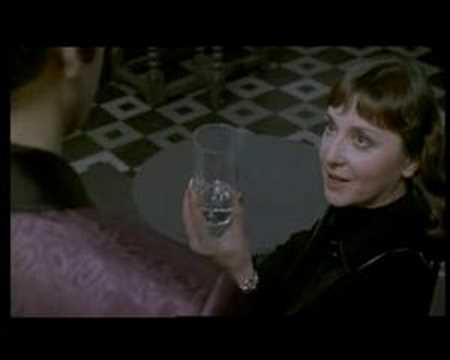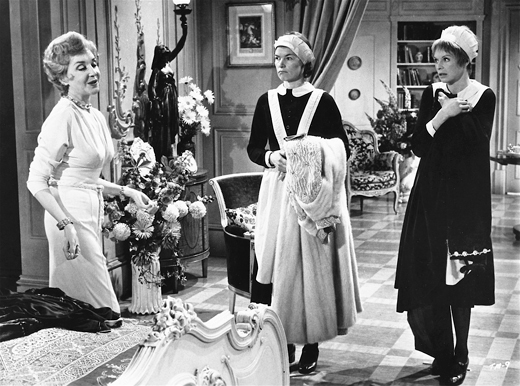Perhaps the closest I’ve come to writing theater criticism are the two reviews I did of the “American Film Theatre” productions of The Homecoming and The Maids in successive issues of the Monthly Film Bulletin in 1976 — a good filming and adaptation of a good play and a terrible filming and adaptation of what I consider an even greater play. So I’m reproducing these two reviews back to back. — J.R.
Homecoming, The
U.S.A./Great Britain, 1973
Director: Peter Hall
An attempt, largely successful, to approximate Peter Hall’s original stage version of The Homecoming in London (1965) and New York (1967), with only two cast changes: Cyril Cusack as Sam in place of John Normington, and Michael Jayston as Teddy in place of two previous Michaels –- Craig (New York) and Bryant (London). The outsized living room continues to function as a sort of masterpiece of hyper-realism, and the cast remains uniformly superb; if memory serves correctly, Paul Rogers has made Max somewhat nastier this time around while Ian Holm’s Lenny has become marginally more charismatic, and both of these changes seem to work to the play’s advantage in terms of overall balance. The only concessions to “opening out” the action are a few establishing or continuity shots of the street outside, some pointless glimpses of Ruth taking her walk, and brief forays into the kitchen. Perhaps the major formal losses are the theater curtain that signaled the play’s division into two acts and the spectator’s fixed distance from the action, which helped to make the setting suggest the inside of a box in which the harsh words rattled like tender buttons. The division of the acts is particular important in terms of their symmetry: both conclude with Max demanding a kiss (first from Teddy, then from Ruth), and while the first masterfully seduces an audience into “accepting” the characters’ behavior on a quasi-naturalistic level, the second proceeds to elucidate the implications of this acceptance. In a manner oddly reminiscent of Ibsen’s middle period, The Homecoming is carefully geared to disclose facts about its characters at precise junctures so that events and identities simultaneously click into place; thus the revelation that Lenny is a pimp coincides with his offer to set Ruth up in business, which also resolves all the earlier hints about her former profession. And Sam’s announcement that “MacGregor had Jessie in the back of my cab”, which prefaces his sudden death, neatly knots several loose ends that the play has left dangling: Max’s boast to Teddy that “I’ve never had a whore under this roof before…since your mother died”; the suggestion that Max may not actually be the father of Lenny or Teddy (indirectly broached by Lenny’s query about the night of his conception, and by the note of complicity struck between Teddy and Sam, who calls Teddy his “favorite of the lads” after inexplicably asking him whether he liked MacGregor); and the fact that Ruth herself has just assumed the roles of a mother figure in the household and a prostitute. Obviously, this is not to suggest that the unarticulated backgrounds of the characters are legible in strictly naturalistic terms, any more than is their behavior; the remarkable control of Pinter’s language guarantees that the dramatic situations are revealed to be even more abstract and diagrammatic as they steadily accumulate psychological density. The bare bones of the dialogue create a structure which is at once social, psychological, and self-referential, with each step forward defining itself in relation to past and future events. Because a spectator can’t attend to all these registers the first time around (which makes the play eminently worth reseeing or rereading), psychological facts are generally made apparent long before they become located in personal histories; thus in the initial dialogue between Lenny and Ruth, the former’s misogyny and the latter’s sexual aggression –- which defines her sudden assertion of power –- are spelled out well in advance of any identification of their respective roles as pimp and prostitute. Such displacements are largely what help to keep The Homecoming shocking in its own lucidity, and fascinating as an arrangement of mutually reflecting prisms. After compelling us to chew on his brittle candy of family resentments and to savor the flavors, Pinter brings things to a head not only by pushing the power relationships to their logical conclusions, but by revealing, in the same movement, precisely what we have already eaten and digested.
— Monthly Film Bulletin, February 1976 (Vol. 43, No. 505)
It’s hard to think of another mangling of a great play on film that’s more upsetting than the British 1974 version of The Maids. I was lucky enough to have once seen a great production of The Maids at Bard College, my alma mater, costarring Blithe Danner (a classmate at the time) as one of the maids. Claude Chabrol’s The Ceremony, while obviously not an adaptation of the Genet, still arguably comes closer to the spirit of Genet’s masterpiece than this monstrosity. — J.R.
Maids, The
Great Britain/Canada, 1974
Director: Christopher Miles
A grotesque manhandling of Genet’s first and most concentrated play — and one of the supreme achievements in modern French theater — Christopher Miles’ version starts things rolling with an appended prologue: a car speeds through Place de la Concorde, and a map is quickly produced showing its destination on Place Vendôme. Arriving at the address, the car sounds its horn and a man leaps nude out of a bedthat is also occupied by an unidentified female and rushes to the window before two men emerge from the car and drag him away; he is next seen being fingerprinted and put behind bars. Quite apart from the absurdity of Paris policemen having to consult a map to navigate four short obvious blocks, and then sounding a horn to alert a criminal before arresting him, the very terms of Genet’s masterpiece — which depend upon a confined space, a highly abstracted and internalized intrigue, and a rigorous restriction of the cast to three women — are violated even before they have a proper chance to declare themselves. Worse still, Genet’s precise system of balances and stresses is virtually torn asunder by meaningless distractions — further cutaways to Monsieur and a flashback showing the mailing of the incriminating letter — once the play itself gets under way. Although the filmmakers have somehow resisted transposing the action to Monte Carlo and adding a score of show tunes, Susannah York none the less launches into her performance of Claire-playing-Madame like a musical comedy star, while Glenda Jackson [as Solange] mainly shows her mettle by grimly rolling her r’s and offering further mannerist demonstrations of proper English diction, undercutting the abstract terrain of the original with the worst naturalistic habits of the English stage. During their subsequent theatrical turns, each actress tends to use the other as a prop, so that the finely tuned folie à deux established in the text — requiring close interplay and a mutual sparking of energies, such as passes between Juliet Berto and Dominique Labourier in Céline et Julie vont en bateau – becomes lost in a non-productive split between autonomous acting styles, heightened by a frequent recourse to cutting between Jackson and York, as though they were performing in different plays. In a work that is fundamentally about imagination and role-playing and the levels of artifice comprising each, one might have supposed that any self-acknowledged acting style could be turned to some advantage within this structure, so long as it were organized into a compulsive pattern that might suggest the masturbatory fantasies of a single individual. But the performances of both leading ladies are so doggedly literal and joyless throughout that the sisters’ machinations quick turn tiresome and unpersuasive. To add insult to injury, this one-act play of modest length is supplied with a break towards the middle, with the same line heard at each end (She didn’t drink it”), apparently to signal an intermission and thereby assure the unwary moviegoer that he is watching an honest-to-goodness “real” play; and lugubrious mood music is thrown in for good measure. In fact, the only note of grace in the entire production is Vivien Merchant’s highly polished enactment of Madame, with catches and sustains just the right tone of artificiality to furnish the maids plausibly with the trappings of their deadly fantasies. Declaring her fidelity to Monsieur and vowing that she’ll follow him “from Devil’s Island to Siberia”, Merchant pronounces that final word with a loving relish that momentarily brings the whole play to life in all its fragrant sweet poisons, reminding one of the greatness that still lurks behind the dull façade of this desiccated version.
—Monthly Film Bulletin, March 1976 (Vol. 43, No. 506)


